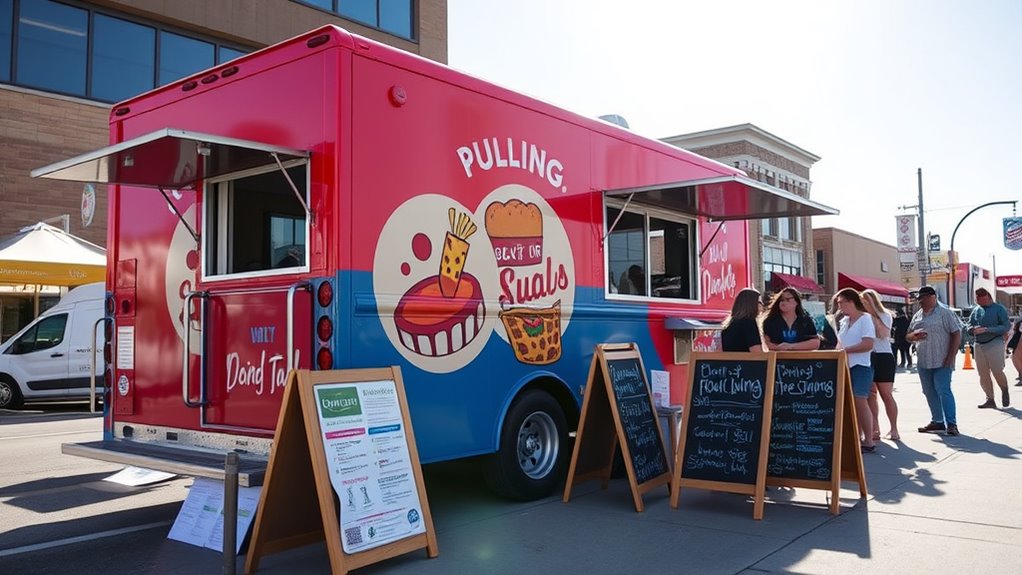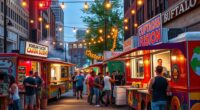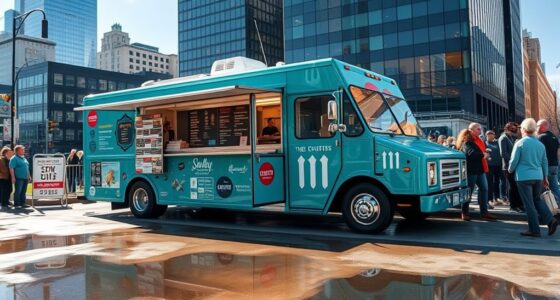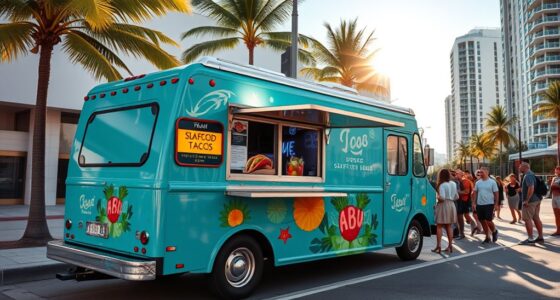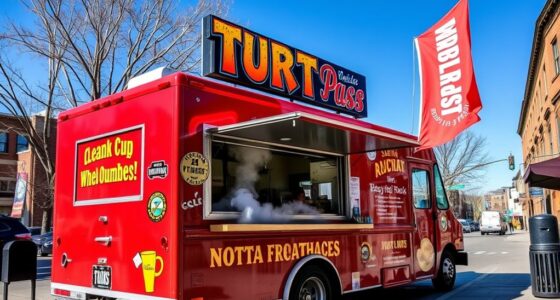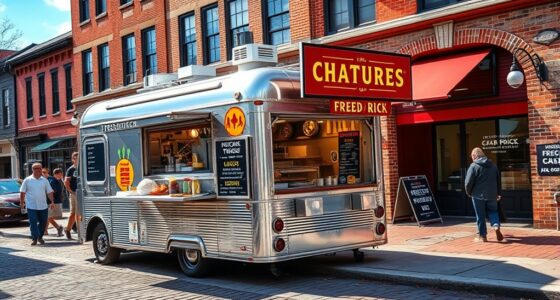To open a food truck in Grand Forks, you’ll need city permits, health licenses, and vehicle insurance, all managed through local and state agencies. Expect startup costs for equipment, permits, and vehicle registration to range from $30,000 to over $200,000. Focus on high-traffic spots like festivals and markets, and develop a safe, appealing menu with effective marketing on social media. Continue exploring these steps to guarantee your food truck’s success.
Key Takeaways
- Obtain necessary city, state, and health department permits, including mobile food unit licenses and vehicle safety standards.
- Budget for startup costs like vehicle purchase, equipment, licensing fees, insurance, and ongoing maintenance.
- Choose high foot-traffic locations such as festivals, farmers markets, parks, and near community centers with proper permits.
- Comply with local regulations on permitted public spaces, parking, and safety requirements outlined in Grand Forks ordinances.
- Use social media marketing and engaging menus focused on minimal on-site cooking to attract customers and boost sales.
Navigating Permitting and Licensing Requirements
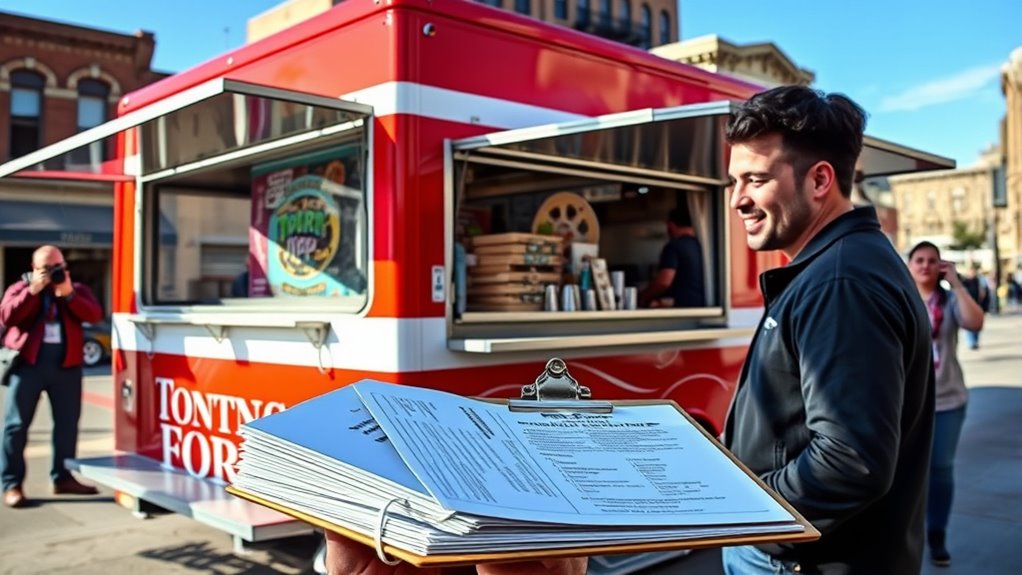
Navigating permitting and licensing requirements for a food truck in Grand Forks involves understanding both city and state regulations. First, you’ll need to secure specific food establishment licenses from the city, which are available online or through printable forms. Mobile food vendors must follow City Code Chapter 21, Article 7, and Ordinance 21-0711, and the Public Health Department manages food safety licenses, including mobile food unit permits. Contact the city licensing department at GFlicensing@grandforksgov.com or call 701-746-2620 for questions. At the state level, you require a Food Establishment License, which involves plan approval from the Division of Food & Lodging and a pre-operational inspection. Additionally, mobile food units must meet fire safety and food safety codes, and vehicle registration and insurance are mandatory. Understanding licensing processes is essential to ensure compliance with all relevant regulations.
Estimating Startup Expenses for Your Food Truck
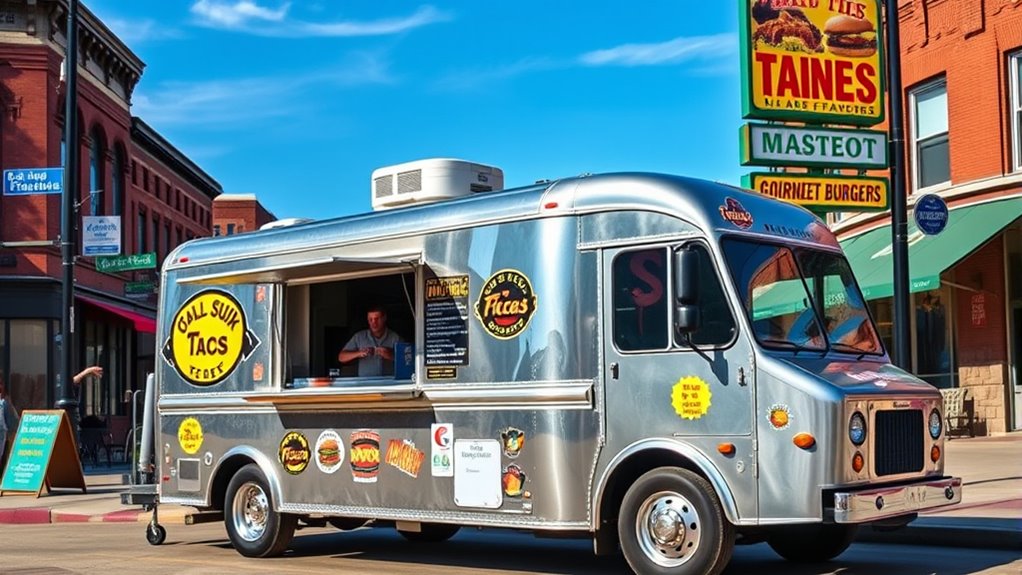
Estimating your startup costs starts with understanding vehicle and equipment prices, which can range from $30,000 to over $200,000 depending on your choices. Don’t forget to budget for licensing and permit fees, which vary by location but may be significant. Planning these expenses carefully helps you set a realistic budget and avoid surprises down the line. Additionally, researching North Dakota cottage food laws can help you determine if you can operate legally without extensive licensing, potentially reducing initial costs.
Equipment and Vehicle Costs
Starting a food truck in Grand Forks involves understanding the costs of your vehicle and equipment, which can vary widely based on your choices. Used trucks typically cost between $30,000 and $85,000, while new custom trucks fully equipped can reach $200,000–$250,000. Renting initially can lower upfront costs. Equipment needs include kitchen appliances like grills and refrigerators, costing $2,000–$3,000, with installation ranging from $5,000–$20,000. Location-specific fees and permits also influence overall startup expenses. Additionally, considering vehicle technology can impact your operational efficiency and maintenance costs over time.
Licensing and Permit Fees
Understanding the licensing and permit fees for your food truck is essential to accurately estimate your startup costs. These fees cover health inspections, regulatory compliance, and operational permits. In North Dakota and Grand Forks, expect to pay around $110 annually for a Mobile Food Unit license, with late fees of $55. Restaurant licenses depend on seating, up to $210, plus penalties. Vending licenses for short-term setups cost about $30. Vehicle registration varies: under 10,000 lbs, $75 for one year; over, $150 for two years. Grand Forks may waive some fees for mobile units, but a Food Establishment license is mandatory. Keep in mind, inspections, plan reviews, and renewal costs are ongoing, making budgeting for these fees vital. Additionally, North Dakota requires food trucks to maintain liability insurance with minimum coverage of $25,000 per person and $50,000 per accident, which should be factored into your overall startup expenses. It’s also advisable to consult local regulations to ensure all compliance requirements are met.
Choosing Prime Locations and Operating Spots
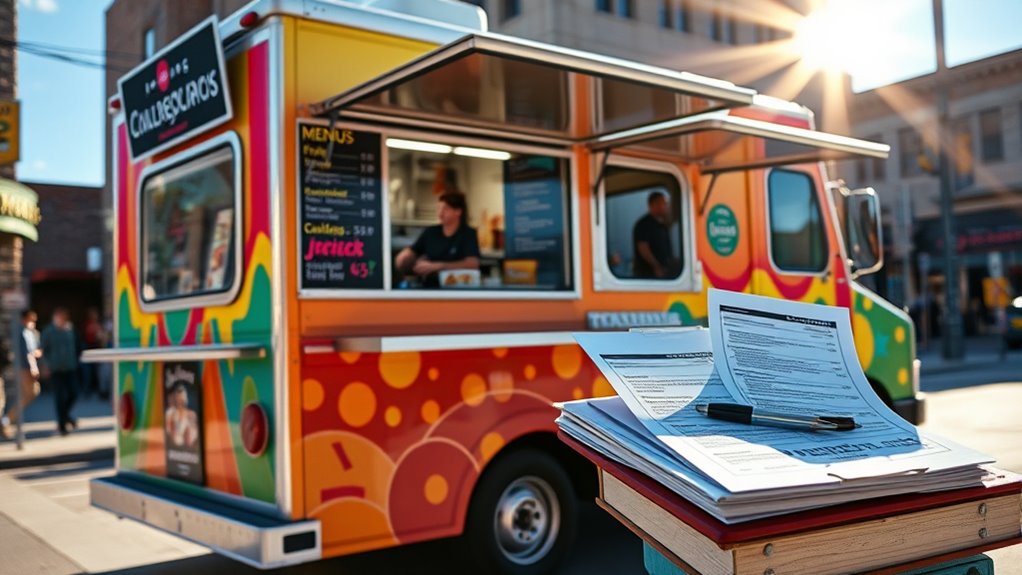
To attract more customers, you need to choose locations with high foot traffic and visibility, like busy streets or parks. Make sure you have the necessary permits to operate in public spaces or private venues, such as corporate campuses and event sites. Picking the right spots can boost sales, but always confirm permit requirements and restrictions before setting up. For example, some popular spots in Grand Forks include outdoor festivals, farmer’s markets, and areas near community centers, which draw a steady flow of potential customers. Food trucks in Grand Forks frequently visit these locations to maximize their reach and sales. Additionally, verifying that your storage and handling practices comply with local health regulations can help maintain the quality and safety of your offerings.
High-Traffic Venues Selection
Choosing the right locations is essential for maximizing your food truck’s sales and visibility. High-traffic venues can substantially boost your customer base and revenue. Focus on areas near event venues, like festivals, sports complexes, and community gatherings, where foot traffic peaks during peak times. Commercial districts, such as office parks and shopping centers, provide steady lunchtime and evening crowds. Proximity to educational institutions attracts students for quick meals and special events. High-visibility street corners and public squares offer consistent pedestrian flow and branding opportunities. Parking lots and retail centers can generate steady sales by tapping into shopper traffic and retail employees. Selecting the right spot involves understanding the ebb and flow of foot traffic and aligning it with your menu and operating hours. Understanding the importance of cookie management and user behavior can also help identify prime locations based on visitor interactions.
Permitted Public Spaces
In Grand Forks, operating your food truck in permitted public spaces requires strict adherence to city regulations and safety standards. You must follow Grand Forks City Ordinance 21-0711, which governs mobile food vendors, including parking within one foot of the curb and selling curbside only. Your vehicle must meet North Dakota safety standards, such as proper lighting, reflectors, and safety equipment. Licenses are issued through the Grand Forks Public Health Department and may include plan reviews and inspections. Allowed locations include city streets, designated event sites, and possibly parks, but you need permits and approval from local authorities. Be aware of restrictions on timing, seasonal limits, and public safety regulations to ensure compliance and smooth operation in public spaces. Furthermore, the city provides a list of approved locations on its official website, which vendors are encouraged to consult regularly for updates. It is also important to stay informed about any changing regulations and updates to licensing requirements that could affect your operating areas.
Crafting a Safe and Appealing Menu

Creating a safe and appealing menu for your food truck starts with selecting ingredients that meet safety standards and are easy to handle in a mobile setting. Focus on sourcing from approved suppliers compliant with North Dakota regulations to guarantee quality. Choose menu items that are safe to store and serve at proper temperatures, minimizing foodborne illness risks. Opt for dishes requiring minimal on-site cooking to reduce contamination and simplify sanitation. Use ingredients that maintain quality during transport and service, and select options that are easy to clean and sanitize. Additionally, clearly label allergen information and offer single-serving condiments to keep customers informed and reduce cross-contact hazards. Implementing proper food preparation techniques can further enhance safety and quality standards for your menu.
Effective Marketing Strategies to Grow Your Business
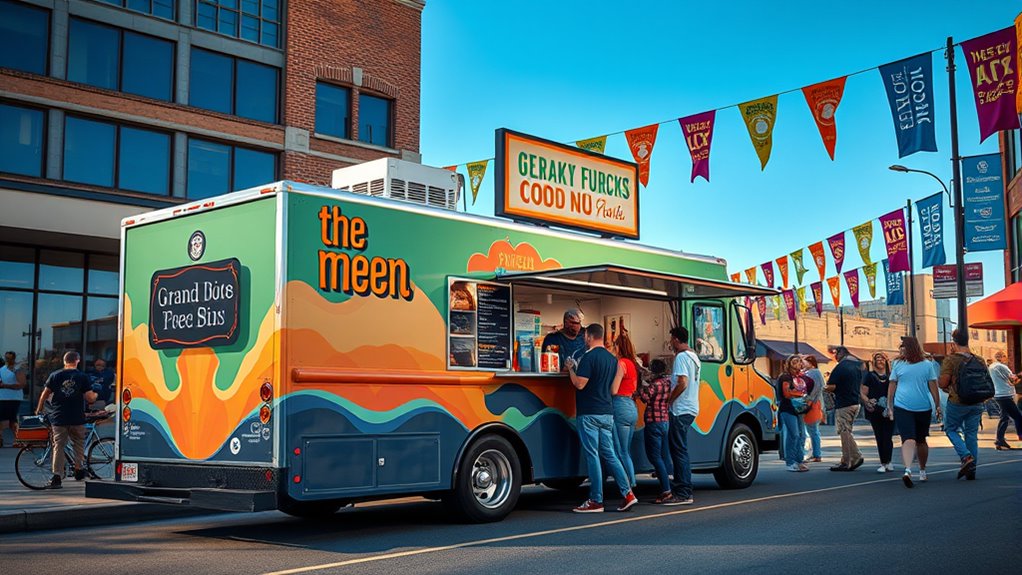
Effective marketing is key to expanding your food truck’s reach and increasing sales. Leveraging social media, especially Facebook, can markedly boost your visibility—about 68% of owners do this regularly, increasing sales by an average of 20%. Customers are more likely to spend around 15% more when you actively engage online, and 40% discover their favorite trucks through social ads. Participating in festivals and local events—at least three annually—can further boost your brand by providing face-to-face interactions and word-of-mouth marketing. Building customer loyalty with rewards programs increases repeat visits by 30%, while data analytics help you identify peak times and popular items for targeted marketing. Over 50% of food trucks have implemented loyalty programs, which contribute to a 30% increase in repeat visits. Incorporating targeted marketing strategies based on customer preferences and behaviors can further enhance your outreach efforts. Combining these strategies creates a strong foundation for growing your food truck business in Grand Forks.
Ensuring Ongoing Compliance and Insurance Coverage
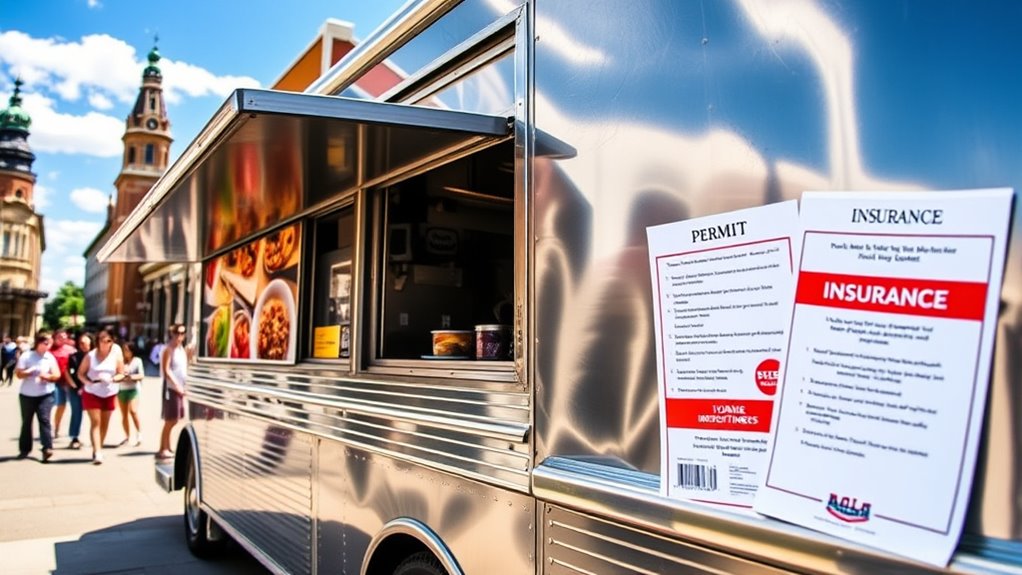
Maintaining ongoing compliance and proper insurance coverage is essential for keeping your food truck business legally protected and operationally sound. Staying current ensures you meet state requirements and avoid fines or disruptions. You should regularly review and renew your insurance policies to maintain adequate coverage limits, including liability, property, and specialized add-ons like food trailer endorsements. Keep all documents—insurance certificates, registration papers, renewal notices—organized and accessible. Monitor any changes in North Dakota laws related to vehicle insurance, health regulations, or food permits. Conduct routine vehicle inspections and maintenance to pass regulatory checks smoothly. Transparency and cooperation with authorities help prevent issues. Staying proactive in compliance safeguards your business’s reputation and longevity. Additionally, understanding the characteristics of a healthy breakfast can contribute to employee wellness initiatives and customer health messaging.
Frequently Asked Questions
How Long Does the Permit Approval Process Typically Take in Grand Forks?
You’re probably wondering how long the permit approval takes. Typically, it ranges from 4 to 8 weeks in Grand Forks. The timeline depends on how complete your application is, the workload of agencies involved, and whether you request expedited processing. To speed things up, stay in close contact with licensing authorities, submit all required documents early, and plan well in advance of your desired opening date.
Are There Specific Health Inspection Requirements for Different Types of Food Trucks?
You ask if health inspection requirements differ for various food truck types. Yes, they do. Depending on what you serve—prepackaged foods, cooked-on-site meals, or high-risk items—inspection focus varies to address specific hazards. Trucks handling high-risk foods or preparing meals on-site face stricter scrutiny. You’ll also need to meet sanitation standards suited to your menu, and inspections adapt to make sure safe food handling practices are maintained across different truck categories.
Can I Operate My Food Truck at Private Events Without Special Permits?
You might think you can operate a food truck at private events without extra permits, but it’s not always true. The reality is, you still need vendor licenses or temporary permits, and approval from the event organizer and property owner. You should check with Grand Forks health department to confirm requirements. Proper food safety, sanitation, and liability coverage are essential, and costs can vary depending on the event’s specifics.
What Are the Best Seasonal Locations for Food Trucks in Grand Forks?
You’re wondering about the best seasonal spots for your food truck in Grand Forks. During warm months, the Town Square Farmers Market on Saturdays offers high foot traffic. Columbia Mall hosts food trucks in spring and summer, while outdoor events like festivals and concerts draw evening crowds. Parks such as Sertoma and Riverside, along with the Riverwalk, attract visitors. Summer events and festivals provide excellent opportunities to serve enthusiastic customers.
How Often Do Food Truck Licenses Need to Be Renewed in North Dakota?
You’re wondering how often you’ll need to renew your food truck license in North Dakota. Typically, licenses require renewal annually or every two years, depending on your specific license type and local rules. Renewal notices usually arrive 30 to 60 days before expiration. Fees are generally between $15 and $30, and you’ll need to submit the renewal form along with any required documentation, like proof of compliance or continuing education.
Conclusion
Starting your food truck in Grand Forks means maneuvering permits, managing costs, selecting prime spots, crafting irresistible menus, and marketing boldly. It’s about balancing permits and profits, locations and loyalty, safety and flavor, compliance and creativity. Embrace each step with confidence, envisioning your truck as a vibrant hub of community, flavor, and opportunity. With perseverance and passion, you’ll turn your food truck dream into a thriving reality on the streets of Grand Forks.
